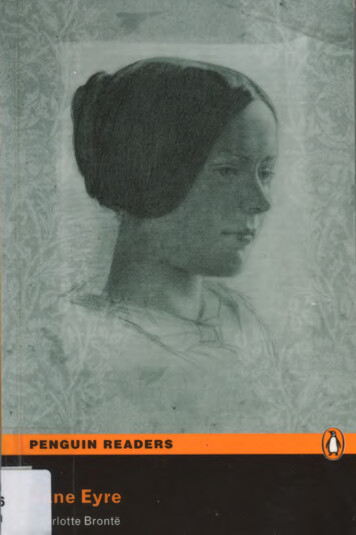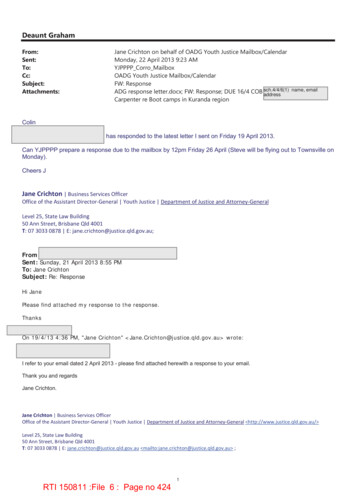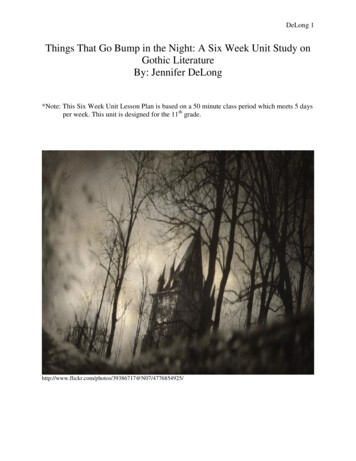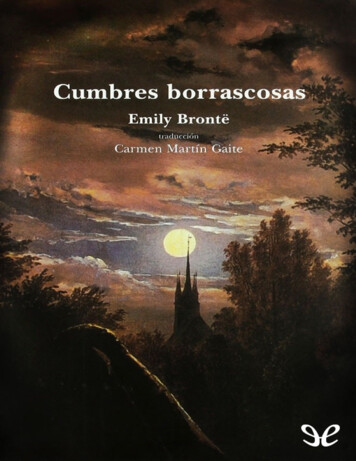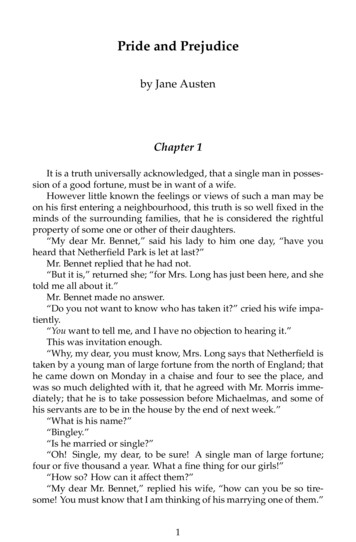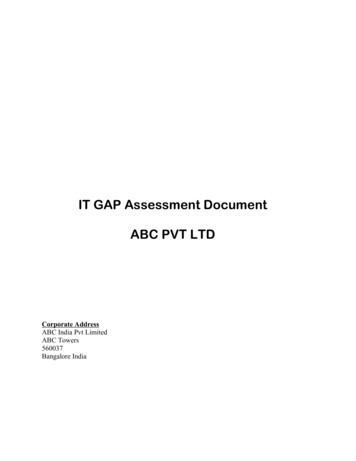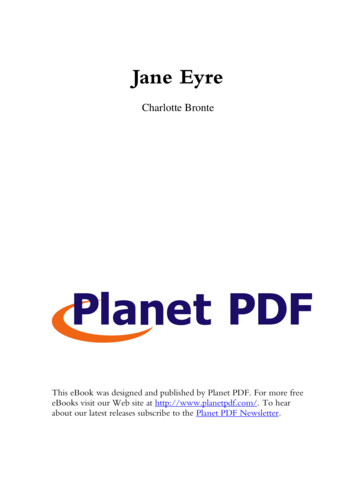
Transcription
Jane EyreCharlotte BronteThis eBook was designed and published by Planet PDF. For more freeeBooks visit our Web site at http://www.planetpdf.com/. To hearabout our latest releases subscribe to the Planet PDF Newsletter.
Jane EyrePrefaceA preface to the first edition of ‘Jane Eyre’ beingunnecessary, I gave none: this second edition demands afew words both of acknowledgment and miscellaneousremark.My thanks are due in three quarters.To the Public, for the indulgent ear it has inclined to aplain tale with few pretensions.To the Press, for the fair field its honest suffrage hasopened to an obscure aspirant.To my Publishers, for the aid their tact, their energy,their practical sense and frank liberality have afforded anunknown and unrecommended Author.The Press and the Public are but vague personificationsfor me, and I must thank them in vague terms; but myPublishers are definite: so are certain generous critics whohave encouraged me as only large-hearted and highminded men know how to encourage a strugglingstranger; to them, i.e., to my Publishers and the selectReviewers, I say cordially, Gentlemen, I thank you frommy heart.2 of 868
Jane EyreHaving thus acknowledged what I owe those who haveaided and approved me, I turn to another class; a smallone, so far as I know, but not, therefore, to beoverlooked. I mean the timorous or carping few whodoubt the tendency of such books as ‘Jane Eyre:’ in whoseeyes whatever is unusual is wrong; whose ears detect ineach protest against bigotry—that parent of crime—aninsult to piety, that regent of God on earth. I wouldsuggest to such doubters certain obvious distinctions; Iwould remind them of certain simple truths.Conventionality is not morality. Self-righteousness isnot religion. To attack the first is not to assail the last. Topluck the mask from the face of the Pharisee, is not to liftan impious hand to the Crown of Thorns.These things and deeds are diametrically opposed: theyare as distinct as is vice from virtue. Men too oftenconfound them: they should not be confounded:appearance should not be mistaken for truth; narrowhuman doctrines, that only tend to elate and magnify afew, should not be substituted for the world-redeemingcreed of Christ. There is—I repeat it—a difference; and itis a good, and not a bad action to mark broadly and clearlythe line of separation between them.3 of 868
Jane EyreThe world may not like to see these ideas dissevered,for it has been accustomed to blend them; finding itconvenient to make external show pass for sterlingworth—to let white-washed walls vouch for clean shrines.It may hate him who dares to scrutinise and expose—torase the gilding, and show base metal under it—topenetrate the sepulchre, and reveal charnel relics: but hateas it will, it is indebted to him.Ahab did not like Micaiah, because he neverprophesied good concerning him, but evil; probably heliked the sycophant son of Chenaannah better; yet mightAhab have escaped a bloody death, had he but stopped hisears to flattery, and opened them to faithful counsel.There is a man in our own days whose words are notframed to tickle delicate ears: who, to my thinking, comesbefore the great ones of society, much as the son of Imlahcame before the throned Kings of Judah and Israel; andwho speaks truth as deep, with a power as prophet-likeand as vital—a mien as dauntless and as daring. Is thesatirist of ‘Vanity Fair’ admired in high places? I cannottell; but I think if some of those amongst whom he hurlsthe Greek fire of his sarcasm, and over whom he flashesthe levin-brand of his denunciation, were to take his4 of 868
Jane Eyrewarnings in time—they or their seed might yet escape afatal Rimoth-Gilead.Why have I alluded to this man? I have alluded to him,Reader, because I think I see in him an intellectprofounder and more unique than his contemporaries haveyet recognised; because I regard him as the first socialregenerator of the day—as the very master of that workingcorps who would restore to rectitude the warped systemof things; because I think no commentator on his writingshas yet found the comparison that suits him, the termswhich rightly characterise his talent. They say he is likeFielding: they talk of his wit, humour, comic powers. Heresembles Fielding as an eagle does a vulture: Fieldingcould stoop on carrion, but Thackeray never does. His witis bright, his humour attractive, but both bear the samerelation to his serious genius that the mere lambent sheetlightning playing under the edge of the summer-clouddoes to the electric death-spark hid in its womb. Finally, Ihave alluded to Mr. Thackeray, because to him—if he willaccept the tribute of a total stranger—I have dedicated thissecond edition of ‘JANE EYRE.’CURRER BELL.December 21st, 1847.NOTE TO THE THIRD EDITION5 of 868
Jane EyreI avail myself of the opportunity which a third editionof ‘Jane Eyre’ affords me, of again addressing a word to thePublic, to explain that my claim to the title of novelistrests on this one work alone. If, therefore, the authorshipof other works of fiction has been attributed to me, anhonour is awarded where it is not merited; andconsequently, denied where it is justly due.This explanation will serve to rectify mistakes whichmay already have been made, and to prevent future errors.CURRER BELL.April 13th, 1848.6 of 868
Jane EyreChapter IThere was no possibility of taking a walk that day. Wehad been wandering, indeed, in the leafless shrubbery anhour in the morning; but since dinner (Mrs. Reed, whenthere was no company, dined early) the cold winter windhad brought with it clouds so sombre, and a rain sopenetrating, that further out-door exercise was now out ofthe question.I was glad of it: I never liked long walks, especially onchilly afternoons: dreadful to me was the coming home inthe raw twilight, with nipped fingers and toes, and a heartsaddened by the chidings of Bessie, the nurse, andhumbled by the consciousness of my physical inferiority toEliza, John, and Georgiana Reed.The said Eliza, John, and Georgiana were nowclustered round their mama in the drawing-room: she layreclined on a sofa by the fireside, and with her darlingsabout her (for the time neither quarrelling nor crying)looked perfectly happy. Me, she had dispensed fromjoining the group; saying, ‘She regretted to be under thenecessity of keeping me at a distance; but that until sheheard from Bessie, and could discover by her own7 of 868
Jane Eyreobservation, that I was endeavouring in good earnest toacquire a more sociable and childlike disposition, a moreattractive and sprightly manner— something lighter,franker, more natural, as it were—she really must excludeme from privileges intended only for contented, happy,little children.’‘What does Bessie say I have done?’ I asked.‘Jane, I don’t like cavillers or questioners; besides, thereis something truly forbidding in a child taking up herelders in that manner. Be seated somewhere; and until youcan speak pleasantly, remain silent.’A breakfast-room adjoined the drawing-room, I slippedin there. It contained a bookcase: I soon possessed myselfof a volume, taking care that it should be one stored withpictures. I mounted into the window-seat: gathering upmy feet, I sat cross-legged, like a Turk; and, having drawnthe red moreen curtain nearly close, I was shrined indouble retirement.Folds of scarlet drapery shut in my view to the righthand; to the left were the clear panes of glass, protecting,but not separating me from the drear November day. Atintervals, while turning over the leaves of my book, Istudied the aspect of that winter afternoon. Afar, it offereda pale blank of mist and cloud; near a scene of wet lawn8 of 868
Jane Eyreand storm-beat shrub, with ceaseless rain sweeping awaywildly before a long and lamentable blast.I returned to my book—Bewick’s History of BritishBirds: the letterpress thereof I cared little for, generallyspeaking; and yet there were certain introductory pagesthat, child as I was, I could not pass quite as a blank. Theywere those which treat of the haunts of sea-fowl; of ‘thesolitary rocks and promontories’ by them only inhabited;of the coast of Norway, studded with isles from itssouthern extremity, the Lindeness, or Naze, to the NorthCape ‘Where the Northern Ocean, in vast whirls,Boilsroundthenaked,melancholyislesOf farthest Thule; and the Atlantic surgePours in among the stormy Hebrides.’Nor could I pass unnoticed the suggestion of the bleakshores of Lapland, Siberia, Spitzbergen, Nova Zembla,Iceland, Greenland, with ‘the vast sweep of the ArcticZone, and those forlorn regions of dreary space,—thatreservoir of frost and snow, where firm fields of ice, theaccumulation of centuries of winters, glazed in Alpineheights above heights, surround the pole, and concentrethe multiplied rigours of extreme cold.’ Of these deathwhite realms I formed an idea of my own: shadowy, like9 of 868
Jane Eyreall the half-comprehended notions that float dim throughchildren’s brains, but strangely impressive. The words inthese introductory pages connected themselves with thesucceeding vignettes, and gave significance to the rockstanding up alone in a sea of billow and spray; to thebroken boat stranded on a desolate coast; to the cold andghastly moon glancing through bars of cloud at a wreckjust sinking.I cannot tell what sentiment haunted the quite solitarychurchyard, with its inscribed headstone; its gate, its twotrees, its low horizon, girdled by a broken wall, and itsnewly-risen crescent, attesting the hour of eventide.The two ships becalmed on a torpid sea, I believed tobe marine phantoms.The fiend pinning down the thief’s pack behind him, Ipassed over quickly: it was an object of terror.So was the black horned thing seated aloof on a rock,surveying a distant crowd surrounding a gallows.Each picture told a story; mysterious often to myundeveloped understanding and imperfect feelings, yetever profoundly interesting: as interesting as the talesBessie sometimes narrated on winter evenings, when shechanced to be in good humour; and when, havingbrought her ironing-table to the nursery hearth, she10 of 868
Jane Eyreallowed us to sit about it, and while she got up Mrs.Reed’s lace frills, and crimped her nightcap borders, fedour eager attention with passages of love and adventuretaken from old fairy tales and other ballads; or (as at a laterperiod I discovered) from the pages of Pamela, and Henry,Earl of Moreland.With Bewick on my knee, I was then happy: happy atleast in my way. I feared nothing but interruption, andthat came too soon. The breakfast-room door opened.‘Boh! Madam Mope!’ cried the voice of John Reed;then he paused: he found the room apparently empty.‘Where the dickens is she!’ he continued. ‘Lizzy!Georgy! (calling to his sisters) Joan is not here: tell mamashe is run out into the rain—bad animal!’‘It is well I drew the curtain,’ thought I; and I wishedfervently he might not discover my hiding-place: norwould John Reed have found it out himself; he was notquick either of vision or conception; but Eliza just put herhead in at the door, and said at once ‘She is in the window-seat, to be sure, Jack.’And I came out immediately, for I trembled at the ideaof being dragged forth by the said Jack.‘What do you want?’ I asked, with awkward diffidence.11 of 868
Jane Eyre‘Say, ‘What do you want, Master Reed?’’ was theanswer. ‘I want you to come here;’ and seating himself inan arm-chair, he intimated by a gesture that I was toapproach and stand before him.John Reed was a schoolboy of fourteen years old; fouryears older than I, for I was but ten: large and stout for hisage, with a dingy and unwholesome skin; thick lineamentsin a spacious visage, heavy limbs and large extremities. Hegorged himself habitually at table, which made himbilious, and gave him a dim and bleared eye and flabbycheeks. He ought now to have been at school; but hismama had taken him home for a month or two, ‘onaccount of his delicate health.’ Mr. Miles, the master,affirmed that he would do very well if he had fewer cakesand sweetmeats sent him from home; but the mother’sheart turned from an opinion so harsh, and inclined ratherto the more refined idea that John’s sallowness was owingto over-application and, perhaps, to pining after home.John had not much affection for his mother and sisters,and an antipathy to me. He bullied and punished me; nottwo or three times in the week, nor once or twice in theday, but continually: every nerve I had feared him, andevery morsel of flesh in my bones shrank when he camenear. There were moments when I was bewildered by the12 of 868
Jane Eyreterror he inspired, because I had no appeal whateveragainst either his menaces or his inflictions; the servantsdid not like to offend their young master by taking mypart against him, and Mrs. Reed was blind and deaf on thesubject: she never saw him strike or heard him abuse me,though he did both now and then in her very presence,more frequently, however, behind her back.Habitually obedient to John, I came up to his chair: hespent some three minutes in thrusting out his tongue atme as far as he could without damaging the roots: I knewhe would soon strike, and while dreading the blow, Imused on the disgusting and ugly appearance of him whowould presently deal it. I wonder if he read that notion inmy face; for, all at once, without speaking, he strucksuddenly and strongly. I tottered, and on regaining myequilibrium retired back a step or two from his chair.‘That is for your impudence in answering mama awhilesince,’ said he, ‘and for your sneaking way of gettingbehind curtains, and for the look you had in your eyestwo minutes since, you rat!’Accustomed to John Reed’s abuse, I never had an ideaof replying to it; my care was how to endure the blowwhich would certainly follow the insult.‘What were you doing behind the curtain?’ he asked.13 of 868
Jane Eyre‘I was reading.’‘Show the book.’I returned to the window and fetched it thence.‘You have no business to take our books; you are adependent, mama says; you have no money; your fatherleft you none; you ought to beg, and not to live here withgentlemen’s children like us, and eat the same meals wedo, and wear clothes at our mama’s expense. Now, I’llteach you to rummage my bookshelves: for they AREmine; all the house belongs to me, or will do in a fewyears. Go and stand by the door, out of the way of themirror and the windows.’I did so, not at first aware what was his intention; butwhen I saw him lift and poise the book and stand in act tohurl it, I instinctively started aside with a cry of alarm: notsoon enough, however; the volume was flung, it hit me,and I fell, striking my head against the door and cutting it.The cut bled, the pain was sharp: my terror had passed itsclimax; other feelings succeeded.‘Wicked and cruel boy!’ I said. ‘You are like amurderer—you are like a slave-driver—you are like theRoman emperors!’I had read Goldsmith’s History of Rome, and hadformed my opinion of Nero, Caligula, &c. Also I had14 of 868
Jane Eyredrawn parallels in silence, which I never thought thus tohave declared aloud.‘What! what!’ he cried. ‘Did she say that to me? Didyou hear her, Eliza and Georgiana? Won’t I tell mama?but first—‘He ran headlong at me: I felt him grasp my hair and myshoulder: he had closed with a desperate thing. I really sawin him a tyrant, a murderer. I felt a drop or two of bloodfrom my head trickle down my neck, and was sensible ofsomewhat pungent suffering: these sensations for the timepredominated over fear, and I received him in frantic sort.I don’t very well know what I did with my hands, but hecalled me ‘Rat! Rat!’ and bellowed out aloud. Aid wasnear him: Eliza and Georgiana had run for Mrs. Reed,who was gone upstairs: she now came upon the scene,followed by Bessie and her maid Abbot. We were parted:I heard the words ‘Dear! dear! What a fury to fly at Master John!’‘Did ever anybody see such a picture of passion!’Then Mrs. Reed subjoined ‘Take her away to the red-room, and lock her inthere.’ Four hands were immediately laid upon me, and Iwas borne upstairs.15 of 868
Jane EyreChapter III resisted all the way: a new thing for me, and acircumstance which greatly strengthened the bad opinionBessie and Miss Abbot were disposed to entertain of me.The fact is, I was a trifle beside myself; or rather OUT ofmyself, as the French would say: I was conscious that amoment’s mutiny had already rendered me liable tostrange penalties, and, like any other rebel slave, I feltresolved, in my desperation, to go all lengths.‘Hold her arms, Miss Abbot: she’s like a mad cat.’‘For shame! for shame!’ cried the lady’s-maid. ‘Whatshocking conduct, Miss Eyre, to strike a young gentleman,your benefactress’s son! Your young master.’‘Master! How is he my master? Am I a servant?’‘No; you are less than a servant, for you do nothing foryour keep. There, sit down, and think over yourwickedness.’They had got me by this time into the apartmentindicated by Mrs. Reed, and had thrust me upon a stool:my impulse was to rise from it like a spring; their two pairof hands arrested me instantly.16 of 868
Jane Eyre‘If you don’t sit still, you must be tied down,’ saidBessie. ‘Miss Abbot, lend me your garters; she wouldbreak mine directly.’Miss Abbot turned to divest a stout leg of the necessaryligature. This preparation for bonds, and the additionalignominy it inferred, took a little of the excitement out ofme.‘Don’t take them off,’ I cried; ‘I will not stir.’In guarantee whereof, I attached myself to my seat bymy hands.‘Mind you don’t,’ said Bessie; and when she hadascertained that I was really subsiding, she loosened herhold of me; then she and Miss Abbot stood with foldedarms, looking darkly and doubtfully on my face, asincredulous of my sanity.‘She never did so before,’ at last said Bessie, turning tothe Abigail.‘But it was always in her,’ was the reply. ‘I’ve toldMissis often my opinion about the child, and Missis agreedwith me. She’s an underhand little thing: I never saw a girlof her age with so much cover.’Bessie answered not; but ere long, addressing me, shesaid—‘You ought to be aware, Miss, that you are under17 of 868
Jane Eyreobligations to Mrs. Reed: she keeps you: if she were toturn you off, you would have to go to the poorhouse.’I had nothing to say to these words: they were not newto me: my very first recollections of existence includedhints of the same kind. This reproach of my dependencehad become a vague sing-song in my ear: very painful andcrushing, but only half intelligible. Miss Abbot joined in ‘And you ought not to think yourself on an equalitywith the Misses Reed and Master Reed, because Missiskindly allows you to be brought up with them. They willhave a great deal of money, and you will have none: it isyour place to be humble, and to try to make yourselfagreeable to them.’‘What we tell you is for your good,’ added Bessie, inno harsh voice, ‘you should try to be useful and pleasant,then, perhaps, you would have a home here; but if youbecome passionate and rude, Missis will send you away, Iam sure.’‘Besides,’ said Miss Abbot, ‘God will punish her: Hemight strike her dead in the midst of her tantrums, andthen where would she go? Come, Bessie, we will leaveher: I wouldn’t have her heart for anything. Say yourprayers, Miss Eyre, when you are by yourself; for if you18 of 868
Jane Eyredon’t repent, something bad might be permitted to comedown the chimney and fetch you away.’They went, shutting the door, and locking it behindthem.The red-room was a square chamber, very seldom sleptin, I might say never, indeed, unless when a chance influxof visitors at Gateshead Hall rendered it necessary to turnto account all the accommodation it contained: yet it wasone of the largest and stateliest chambers in the mansion.A bed supported on massive pillars of mahogany, hungwith curtains of deep red damask, stood out like atabernacle in the centre; the two large windows, withtheir blinds always drawn down, were half shrouded infestoons and falls of similar drapery; the carpet was red; thetable at the foot of the bed was covered with a crimsoncloth; the walls were a soft fawn colour with a blush ofpink in it; the wardrobe, the toilet-table, the chairs wereof darkly polished old mahogany. Out of these deepsurrounding shades rose high, and glared white, the piledup mattresses and pillows of the bed, spread with a snowyMarseilles counterpane. Scarcely less prominent was anample cushioned easy-chair near the head of the bed, alsowhite, with a footstool before it; and looking, as Ithought, like a pale throne.19 of 868
Jane EyreThis room was chill, because it seldom had a fire; it wassilent, because remote from the nursery and kitchen;solemn, because it was known to be so seldom entered.The house-maid alone came here on Saturdays, to wipefrom the mirrors and the furniture a week’s quiet dust: andMrs. Reed herself, at far intervals, visited it to review thecontents of a certain secret drawer in the wardrobe, wherewere stored divers parchments, her jewel-casket, and aminiature of her deceased husband; and in those last wordslies the secret of the red-room—the spell which kept it solonely in spite of its grandeur.Mr. Reed had been dead nine years: it was in thischamber he breathed his last; here he lay in state; hence hiscoffin was borne by the undertaker’s men; and, since thatday, a sense of dreary consecration had guarded it fromfrequent intrusion.My seat, to which Bessie and the bitter Miss Abbot hadleft me riveted, was a low ottoman near the marblechimney-piece; the bed rose before me; to my right handthere was the high, dark wardrobe, with subdued, brokenreflections varying the gloss of its panels; to my left werethe muffled windows; a great looking-glass between themrepeated the vacant majesty of the bed and room. I wasnot quite sure whether they had locked the door; and20 of 868
Jane Eyrewhen I dared move, I got up and went to see. Alas! yes:no jail was ever more secure. Returning, I had to crossbefore the looking-glass; my fascinated glanceinvoluntarily explored the depth it revealed. All lookedcolder and darker in that visionary hollow than in reality:and the strange little figure there gazing at me, with awhite face and arms specking the gloom, and glitteringeyes of fear moving where all else was still, had the effectof a real spirit: I thought it like one of the tiny phantoms,half fairy, half imp, Bessie’s evening stories represented ascoming out of lone, ferny dells in moors, and appearingbefore the eyes of belated travellers. I returned to mystool.Superstition was with me at that moment; but it wasnot yet her hour for complete victory: my blood was stillwarm; the mood of the revolted slave was still bracing mewith its bitter vigour; I had to stem a rapid rush ofretrospective thought before I quailed to the dismalpresent.All John Reed’s violent tyrannies, all his sisters’ proudindifference, all his mother’s aversion, all the servants’partiality, turned up in my disturbed mind like a darkdeposit in a turbid well. Why was I always suffering,always browbeaten, always accused, for ever condemned?21 of 868
Jane EyreWhy could I never please? Why was it useless to try towin any one’s favour? Eliza, who was headstrong andselfish, was respected. Georgiana, who had a spoiledtemper, a very acrid spite, a captious and insolent carriage,was universally indulged. Her beauty, her pink cheeks andgolden curls, seemed to give delight to all who looked ather, and to purchase indemnity for every fault. John noone thwarted, much less punished; though he twisted thenecks of the pigeons, killed the little pea-chicks, set thedogs at the sheep, stripped the hothouse vines of theirfruit, and broke the buds off the choicest plants in theconservatory: he called his mother ‘old girl,’ too;sometimes reviled her for her dark skin, similar to hisown; bluntly disregarded her wishes; not unfrequently toreand spoiled her silk attire; and he was still ‘her owndarling.’ I dared commit no fault: I strove to fulfil everyduty; and I was termed naughty and tiresome, sullen andsneaking, from morning to noon, and from noon to night.My head still ached and bled with the blow and fall Ihad received: no one had reproved John for wantonlystriking me; and because I had turned against him to avertfarther irrational violence, I was loaded with generalopprobrium.22 of 868
Jane Eyre‘Unjust!—unjust!’ said my reason, forced by theagonising stimulus into precocious though transitorypower: and Resolve, equally wrought up, instigated somestrange expedient to achieve escape from insupportableoppression—as running away, or, if that could not beeffected, never eating or drinking more, and letting myselfdie.What a consternation of soul was mine that drearyafternoon! How all my brain was in tumult, and all myheart in insurrection! Yet in what darkness, what denseignorance, was the mental battle fought! I could notanswer the ceaseless inward question—WHY I thussuffered; now, at the distance of—I will not say how manyyears, I see it clearly.I was a discord in Gateshead Hall: I was like nobodythere; I had nothing in harmony with Mrs. Reed or herchildren, or her chosen vassalage. If they did not love me,in fact, as little did I love them. They were not bound toregard with affection a thing that could not sympathisewith one amongst them; a heterogeneous thing, opposedto them in temperament, in capacity, in propensities; auseless thing, incapable of serving their interest, or addingto their pleasure; a noxious thing, cherishing the germs ofindignation at their treatment, of contempt of their23 of 868
Jane Eyrejudgment. I know that had I been a sanguine, brilliant,careless, exacting, handsome, romping child—thoughequally dependent and friendless—Mrs. Reed would haveendured my presence more complacently; her childrenwould have entertained for me more of the cordiality offellow-feeling; the servants would have been less prone tomake me the scapegoat of the nursery.Daylight began to forsake the red-room; it was pastfour o’clock, and the beclouded afternoon was tending todrear twilight. I heard the rain still beating continuouslyon the staircase window, and the wind howling in thegrove behind the hall; I grew by degrees cold as a stone,and then my courage sank. My habitual mood ofhumiliation, self-doubt, forlorn depression, fell damp onthe embers of my decaying ire. All said I was wicked, andperhaps I might be so; what thought had I been but justconceiving of starving myself to death? That certainly wasa crime: and was I fit to die? Or was the vault under thechancel of Gateshead Church an inviting bourne? In suchvault I had been told did Mr. Reed lie buried; and led bythis thought to recall his idea, I dwelt on it with gatheringdread. I could not remember him; but I knew that he wasmy own uncle—my mother’s brother—that he had takenme when a parentless infant to his house; and that in his24 of 868
Jane Eyrelast moments he had required a promise of Mrs. Reed thatshe would rear and maintain me as one of her ownchildren. Mrs. Reed probably considered she had kept thispromise; and so she had, I dare say, as well as her naturewould permit her; but how could she really like aninterloper not of her race, and unconnected with her, afterher husband’s death, by any tie? It must have been mostirksome to find herself bound by a hard-wrung pledge tostand in the stead of a parent to a strange child she couldnot love, and to see an uncongenial alien permanentlyintruded on her own family group.A singular notion dawned upon me. I doubted not—never doubted— that if Mr. Reed had been alive hewould have treated me kindly; and now, as I sat looking atthe white bed and overshadowed walls— occasionally alsoturning a fascinated eye towards the dimly gleaningmirror—I began to recall what I had heard of dead men,troubled in their graves by the violation of their lastwishes, revisiting the earth to punish the perjured andavenge the oppressed; and I thought Mr. Reed’s spirit,harassed by the wrongs of his sister’s child, might quit itsabode—whether in the church vault or in the unknownworld of the departed—and rise before me in thischamber. I wiped my tears and hushed my sobs, fearful lest25 of 868
Jane Eyreany sign of violent grief might waken a preternatural voiceto comfort me, or elicit from the gloom some haloed face,bending over me with strange pity. This idea, consolatoryin theory, I felt would be terrible if realised: with all mymight I endeavoured to stifle itI endeavoured to be firm.Shaking my hair from my eyes, I lifted my head and triedto look boldly round the dark room; at this moment alight gleamed on the wall. Was it, I asked myself, a rayfrom the moon penetrating some aperture in the blind?No; moonlight was still, and this stirred; while I gazed, itglided up to the ceiling and quivered over my head. I cannow conjecture readily that this streak of light was, in alllikelihood, a gleam from a lantern carried by some oneacross the lawn: but then, prepared as my mind was forhorror, shaken as my nerves were by agitation, I thoughtthe swift darting beam was a herald of some coming visionfrom another world. My heart beat thick, my head grewhot; a sound filled my ears, which I deemed the rushing ofwings; something seemed near me; I was oppressed,suffocated: endurance broke down; I rushed to the doorand shook the lock in desperate effort. Steps came runningalong the outer passage; the key turned, Bessie and Abbotentered.‘Miss Eyre, are you ill?’ said Bessie.26 of 868
Jane Eyre‘What a dreadful noise! it went quite through me!’exclaimed Abbot.‘Take me out! Let me go into the nursery!’ was my cry.‘What for? Are you hurt? Have you seen something?’again demanded Bessie.‘Oh! I saw a light, and I thought a ghost would come.’I had now got hold of Bessie’s hand, and she did notsnatch it from me.‘She has screamed out on purpose,’ declared A
I returned to my book—Bewick’s History of British Birds: the letterpress thereof I cared little for, generally speaking; and yet there were certain introductory pages that, child as I was, I could not pass quite as a blank. They
